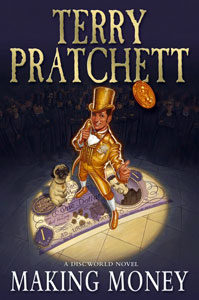Like Going Postal, Making Money starts with a deus ex Vetinari. Moist van Lipwig has brought the Royal Post back to life, but the operation is running so smoothly that being in charge no longer satisfies his urge to take ridiculous risks. Lord Vetinari, the Patrician who rules the great city of Ankh-Morpork with a lightly tyrannical hand, sees what is happening and make van Lipwig an offer he can’t long refuse: ensuring the stability of the Royal Mint and, incidentally, expanding credit enough so that long-delayed public works projects can be financed.
As the story opens, the situation at the city’s banking system is anything but minty fresh, and that is having effects on the population, even in a quasi-medieval setting filled with wizards and Guilds and suchlike. Van Lipwig’s success at the Post plays a role, too. The stamps are convenient enough and available enough that people have been using them as a means of exchange, particularly for small transactions. Vetinari explains, “But they keep their money in old socks. They trust their socks more than they trust banks. Coinage is in artificially short supply, which is why your postage stamps are now a de facto currency. Our serious banking system is a mess. A joke, in fact.”
Van Lipwig, who has been both a con man and a showman, often both at once, counters, “It’ll be a bigger joke if you put me in charge.” (p. 38)
Except that it turns out a showman and a scoundrel are exactly what banking in Ankh-Morpork needs. The Lavish family, who have run the Mint since time out of mind have been using it to fund their eponymous spending. The Mint makes a loss on much of its physical production of coins. Its methods are antique, even by local standards. Its customer base is dwindling. It plays practically no role in credit formation.
Early on, Vetinari asks the crucial question, “What does gold know of true worth?” That comes at the end of a short back-and-forth with van Lipwig about tradition and innovation.
“You took our joke of a Post Office, Mr Lipwig, and made it a solemn undertaking. But the banks of Ankh-Morpork, sir, are very serious indeed. They are serious donkeys Mr Lipwig. There have been too many failures. They’re stuck in the mud, they live in the past, they are hypnotized by class and wealth, they think gold is important.”
“Er … isn’t it?”
“No. And thief and swindler that you are, pardon me, once were, you know it, deep down. For you, it was just a way of keeping score,” said Vetinari. “What does gold know of true worth?” (p. 37)
He then touches on the true backing of money, “a large, bustling city, full of ingenious people spinning wealth out of the common clay of the world. They construct, build, carve, bake, cast, mould, forge and devise strange and inventive crimes.” (pp. 37–38) Gold has very little to do with it, no matter what the traditionalists think.
Structurally, the book is a paean to fiat money. As has been said of turtles, it’s promises all the way down. Van Lipwig’s gifts for inspiring confidence come in handy when he is one of the first to discover that there is much less gold in the Mint than has been generally assumed, and not everyone is convinced of the new approach to money, backed by the industriousness of the city. It’s a thing damn’d close to a bank run.
Van Lipwig is not a complete charlatan. Here he is in conversation with Mr Bent, the Mint’s chief clerk and de facto operational head. Bent is also a gold bug of the first order.
Van Lipwig: “Look, I’ve been reading. The banks issue coins to four times the amount of the gold they hold. That’s a nonsense we could do without. It’s a dream world. This city is rich enough to be its own gold bar!”
“They’re trusting you for no good reason,” said Bent. … “There must be something which has a worth that goes beyond fashion and politics, a worth that endures.” (pp. 192–93)
For Bent, that something is gold. Making Money is, among other things, an extended demonstration that Bent’s position is untenable.
There are many other things in the book’s 470 pages, including plenty of humor and adventure. There’s quite a bit about the respectability or lack thereof of various businesses, and the snobbery behind much of banking as it is actually practiced. There is also a long plotline concerning golems and deterrence in international wars. The Watch turns up, in the nick of time, as does a zombie lawyer, who has a rather more expansive view of time. Igor has been there all along.
At the end of the teller’s hours, though, Making Money is all about just what the title says. People make money, full stop.

